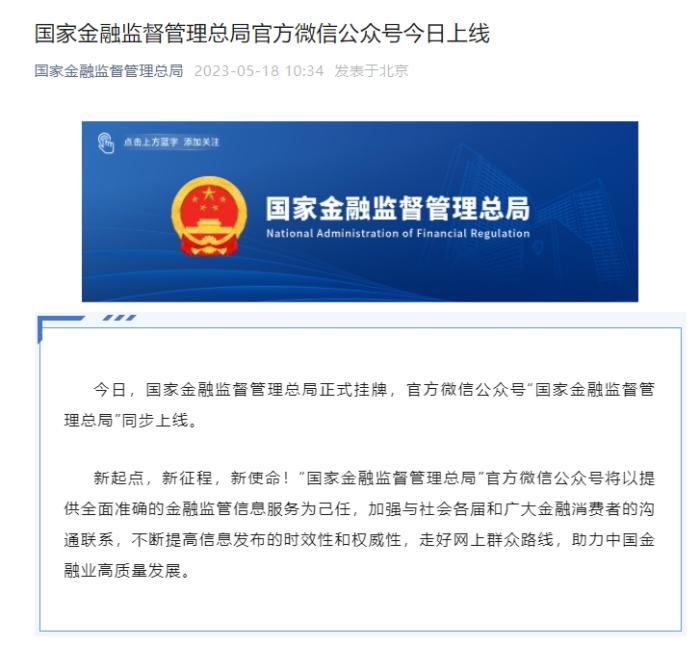BEIJING, May 18 (Zhongxin Finance Gong Hongyu Xie Yiguan) On the morning of May 18, the State Financial Supervision and Administration was officially unveiled at No.15, Beijing Financial Street.
As a red curtain slowly falls, China’s new round of institutional reform in the field of financial supervision has taken an important step.
What’s the function?
According to the "Party and State Institutional Reform Plan", the State Financial Supervision and Administration Bureau is responsible for the supervision of the financial industry except the securities industry, strengthening institutional supervision, behavioral supervision, functional supervision, penetrating supervision and continuous supervision, coordinating the protection of financial consumers’ rights and interests, strengthening risk management and preventive disposal, and investigating and handling illegal acts according to law, as an institution directly under the State Council.
The State Financial Supervision and Administration Bureau was established on the basis of the Bank of China Insurance Regulatory Commission, and the daily supervision duties of the People’s Bank of China on financial holding companies and other financial groups, the protection duties of financial consumers and the investor protection duties of the China Securities Regulatory Commission were assigned to the State Financial Supervision and Administration Bureau.
At the same time, the Bank of China Insurance Regulatory Commission is no longer retained, and the supervision pattern of "one line, two meetings" has become a thing of the past.
What’s the point?
In the eyes of many market analysts, the establishment of the State Financial Supervision and Administration Bureau is based on the background that China’s separate supervision system is not suitable for the comprehensive operation trend of the financial industry, and the communication between financial supervision departments is not smooth and coordination is insufficient.
Dong Ximiao, chief researcher of Zhaolian, said that in recent years, after a period of rapid development, China’s financial industry has generated and accumulated certain financial risks, which has affected financial development and stability to some extent.
This year’s government work report pointed out that major economic and financial risks should be effectively prevented and resolved, and the prevention of regional and systemic financial risks should be emphasized.
Ming Ming, chief economist of CITIC Securities, said that the establishment of the State Financial Supervision and Administration Bureau can form a joint regulatory force in a timely and effective manner in the face of risk events, and gradually establish a regulatory framework that conforms to the innovative development characteristics of modern financial mixed operations, keep the bottom line of systemic financial risks and standardize the trading behavior between financial institutions and investors.
In addition, Dong Ximiao mentioned that after the reform of the financial supervision system, the "double peaks" supervision with China characteristics has further revealed its clues — — The People’s Bank of China is mainly responsible for monetary policy and macro-prudential supervision; The State Financial Supervision and Administration Bureau is responsible for the supervision of the financial industry except the securities industry and the protection of the rights and interests of financial consumers. The CSRC is responsible for the supervision of the capital market and increasing the responsibilities of auditing the issuance of corporate bonds.
After the re-allocation of functions, Dong Ximiao believes that the unified responsibility of the State Financial Supervision and Administration Bureau for financial supervision except the securities industry will help reduce regulatory gaps and regulatory overlap, and implement behavioral supervision and functional supervision.
What’s the action?
The reporter noted that on the 18th, the official WeChat of the State Financial Supervision and Administration Bureau, WeChat official account, was launched simultaneously, and the official website of the State Financial Supervision and Administration Bureau was officially launched.

Screenshot of official WeChat WeChat official account of State Financial Supervision and Administration Bureau.
Earlier, on the afternoon of May 10th, the State Financial Supervision and Administration Bureau held a meeting of leading cadres. The responsible comrades of the Organization Department of the Central Committee announced the central decision: Comrade Li Yunze was appointed Party Secretary of the State Financial Supervision and Administration Bureau.
On March 28th, official website, China Banking and Insurance Regulatory Commission released the Department Budget of State Financial Supervision and Administration Bureau (China Banking and Insurance Regulatory Commission) for 2023.
The document shows that in 2023, the State Financial Supervision and Administration Bureau is expected to send 2,000 inspection teams of banking institutions and check about 2,500 banking institutions; It is estimated that about 800 inspection teams of non-bank institutions will be dispatched and about 800 inspections of non-bank institutions will be conducted; It is estimated that there are about 23 supervision cases and about 40 supervision and inspection cases.
Specifically, first, for banking institutions, a series of comprehensive inspections, special inspections and online inspections will be carried out in 2023, highlighting the reform of small and medium-sized banks, effectively preventing systemic risks, continuously filling the shortcomings of the regulatory system, standardizing the financial market order, protecting the legitimate rights and interests of consumers, and improving the quality and efficiency of serving the real economy.
Second, the special inspection of non-bank institutions will focus on key institutions, and select market entities such as insurance companies, trust companies and financial asset investment companies to carry out targeted on-site inspections. The inspection contents include risk management and effectiveness of internal control of insurance companies, implementation of major policies of agricultural insurance companies, compliance inspection of key businesses of other non-bank institutions, and compliance inspection of small and medium-sized non-bank institutions. (End)
关于作者